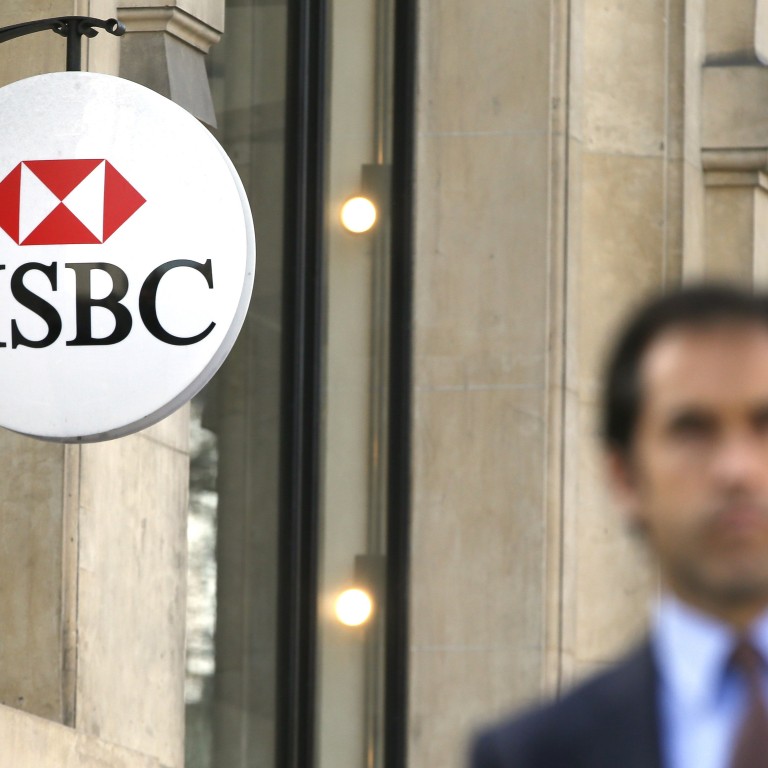
HSBC falls from market darling to also-ran status in Hong Kong rally
HSBC used to be a premier stock which used to headline the local market years ago. These days, it has lost its shine in the recent rally in Hong Kong.
The biggest lender in the city is down 4.75 per cent from the start of the year and ended on Wednesday at HK$70.45 while the Hang Seng Index is 18.97 per cent up year to date. The benchmark index has been hitting fresh 7-year highs almost on a daily basis because of a strong stream of funds from mainland investors sloshing into the local market.
“HSBC has long lost the role as the driver of the stock market in Hong Kong. The crown has already passed onto Hong Kong Exchanges and Clearing as well as many other mainland internet stocks,” said Joseph Tong Tang, executive director of Sun Hung Kai Financial.
“Its earnings and prospects are not good while it was fined by regulators in recent years. HSBC is no longer the darling in the eyes of investors,” Tong said.
HSBC used to be market favourite of both fund managers and retail investors as Hong Kongers considered it a home grown success story. Many people bought the shares as a gift for new born infants or for their retirement.
The rally shows how far it has fallen out of favour. Its share price lagged those of its peers and it was never among the top five most traded stocks during the surge. In happier days, it was always the most heavily traded stock in the market.
Its peers are now enjoying a star turn in this rally. Hong Kong Exchanges and Clearing, the local exchange operator, hit a record HK$300 before closing at HK$294.5 on Wednesday. It is up 71.46 per cent this year and 50 per cent in the past two weeks.
Industrial and Commercial Bank of China, the top lender on the mainland, soared to a six-year peak at HK$7.1 last week and closed at HK$6.98 on Wednesday – up 20 per cent in the past two weeks.
Internet stocks such as Tencent vaulted up 45 per cent this year, while China Mobile rose 27 per cent this year and 11 per cent the past two weeks.
Henry Chan Yue-hung, the chief investment officer of BEA Union Investment Management, said investors are no longer enamoured about HSBC.
“HSBC has been underperforming both Hang Seng Index and FTSE 100 in the UK. So the switching of funds out of it and into Chinese stocks in HK only explains part of the story. This was also because HSBC’s earnings outlook is deteriorating,” Chan said.
Earnings per share has been pegged by reports at around US$0.839, compared to about $1 in July last year.
Chan added that HSBC’s weighting in the Hang Seng index is now smaller due to its underperformance and its role was also impacted by the change in the index weighting methodology.
“While it is still one of the largest names in the index, its significance is considerably less,” he said.
Mark Konyn, chief executive of Cathay Conning Asset Management, said HSBC as a global bank is not considered a direct beneficiary of initiatives from the mainland government and the People’s Bank of China (PBOC).
It will not stand to benefit as much from the announcement by the PBOC on Sunday for a 1.0 percentage point reduction in the reserve requirement ratio (RRR) to 18.5 per cent, following a 0.5 per cent percentage point cut on February 4 and two interest rate cuts since last November. The estimated 1.2 trillion yuan in additional funds will tend to boost the slowing mainland economy.
“HSBC has not garnered the same attention as Mainland banks, insurers and brokers,” Konyn said.
“The mainland investors focused on those companies known on the mainland which are expected to benefit from the selective stimulus and policy easing in China,” he added.
Konyn said the Hong Kong market in recent years has transformed into 2 distinct groups - those that are China related, and those that are more global or Hong Kong related.
“Factors over the past year have delineated quite clearly between the two groups, favouring China themed investments. Hong Kong listed H shares remain at a valuation discount to their Mainland peers, a factor that is now likely to drive Hong Kong prices further,” Konyn said.
“Banks globally have struggled in recent years to streamline their businesses and cope with the regulatory and economic implications of the global financial crisis. This has involved cost cutting, a realignment to take account of cost of capital issues, and in many cases a refocus in terms of geographic coverage and business lines.”
“HSBC is well down the track in this process but it is likely to take longer for the company to recapture investors’ appetite,” he said.

